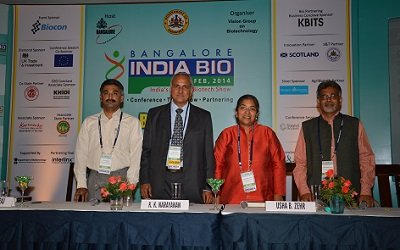Inside BENEO’s new pulse plant: pioneering sustainable protein from faba beans
The 14th edition of Bangalore INDIA BIO (BIB) 2014 organized by the Department of Information Technology, Bio-Technology and Science & Technology, Government of Karnataka, Vision Group on Biotechnology and MM Activ Sci-Tech Communications at Bangalore witnessed a seminar on Agribiotech – Ensuring and Nutritional Security on Feb 11, 2014.
Dr P U Krishnaraj, professor and head of the department of biotechnology, coordinator, Institute of AgriBiotechnology, College of Agriculture, Dharwad in his presentation on biological approaches for food and nutritional security whilst ensuring sustainability said that Accelerated Breeding Programmes, Translational Research, Conserving Soil Health, Conservation and Utilization of Genetic Resources and Water Recycling are some of key biological approaches, which will help to provide food and nutrition security.
Quoting World Health Organisation (WHO) report, he said that about 124 million children have been affected with Vitamin A deficiency (VAD), with 250,000-500,000 children go blind every year, about half of them die within 12 months. The answer to this is Rice engineered to produce a precursor to Vitamin A. Presence of pro-vitamin A gives rice grains a yellowish-orange color, thus, the named as ‘Golden Rice’.
(Seen in picture from L-R – Dr P U Krishnaraj, professor and head of the department of biotechnology, coordinator, Institute of AgriBiotechnology, College of Agriculture, Dharwad, Dr K K Narayanan, managing director, Metahelix Life Sciecnces, Dr Usha Barwale Zehr, Chief Technology Officer, Maharashatra Hydrid Seeds Company Ltd, Jalna, Dr Chenna Reddy Aswath, Principal scientist and head, division of biotechnology, Indian Institute of Horticultural Research (IIHR), Bangalore)
Stressing the need for water recycling, he said that farming accounts for around 70% of water used in the world today. About 47% of the world’s population could be living under severe water stress by 2050. Urbanisation, industrialisation and climate change will provide agriculture with more competition for water resources as less than 2% of the Earth’s water supply is fresh water with remaining 97% is salt water found in oceans and seas. Only 1% of the earth’s water is available for drinking water. Two percent is frozen. He further said that to make a cup of coffee it takes 208 litres of water, with most of that H2O used to grow the coffee beans.
Dr Usha Barwale Zehr, Chief Technology Officer, Maharashatra Hydrid Seeds Company Ltd, Jalna sharing her views on agriculture research and partnership for food security said that even after having independence still we are facing food related challenges. During 1960’s we have the issues such as our population was at 400 million, Hunger and starvation, No food reserves –need to import, Productivity challenges. Now we have population about 1.12 billion, significant prevalence of poverty and malnutrition, Bumper food production in the last few years and Grainaries over flowing with grain and Distribution challenges.
She further said that this change that we are witnessing is mainly due to use of agribiotechnology through – Breeding (Traditional breeding, Mutation breeding (Molecular tools), Molecular breeding, Wide hybridization), gene modification, gene discovery, Transformation and biological treatments and microbial treatments. Inspite of use of technologies, we are still facing many challenges such as Reducing the product development cycle, Need to bring down overall costs per data point, Must move to high through put platforms and No single “go-to” facility which is cost effective.
Dr Chenna Reddy Aswath, Principal scientist and head, division of biotechnology, Indian Institute of Horticultural Research (IIHR), Bangalore sharing his thoughts on Can biotech guarantee better food and nutrition security? recalled the Bengal famine of 1943 that killed an estimated 3 million people due to starvation, malnutrition and disease. Then during 1954-74 India imported about 50 million tons of food grains. With vision and support of then prime minister Indira Gandhi, C Subramaniam, agriculture minister and Prof M S Swaminathan brought green resolution to India turning India from food importer to food exporter. This helped India successfully to conduct nuclear tests in 1974 and 1998. Our agriculture scientists have been using Transgenic technology, Tissue culture, Haploid breeding, Molecular markers and Bio-pesticides / Bio-fertilizers and achieved significant milestones in development of new varieties of crops which are in good quality, taste, long shelf life, virus resistance, Insect resistance, Good flavour, High Sweetness and Nematode resistance.
Dr K K Narayanan, managing director, Metahelix Life Sciecnces, who chaired the session said major challenges the industry is facing include Product awaiting commercialization approval, delayed decisions from regulatory authority, No research activity allowed in addition to commercialization. This has created negative impact on overall sentiment across various groups including students wanting to opt for biotechnology.

